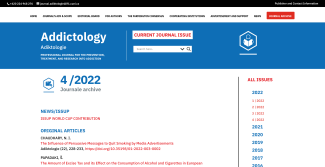The Influence of Persuasive Messages to Quit Smoking by Media Advertisements

INTRODUCTION: The high rate of substance use highlights the need to intervene in the initial use prevention of smoking tobacco. The aim was to determine the efficacy of anti-smoking messages
to motivate smoking cessation.
METHODS: It was hypothesized that the messages would reduce the frequency of smoking. The influence of the messages on the intention to smoke, negative emotions, perceived self-efficacy, and health behavior were also measured. Relevant reliable and valid questionnaires were used to collect data for this experimental study. RESULTS: In this study mean differences were calculated. The findings revealed differences between the response scores in the experimental and control groups for the study variables. CONCLUSIONS:
These findings implied the necessity for the creation of new policies for advertising agencies. Further, it suggests the use of effective anti-smoking messages with patients who smoke to prevent the worsening and progression of substance use in the future. It is recommended that future researchers replicate the study with a variety of populations and settings for the effect of substance use other than smoking.
Author/Researcher:
Dr. Nazish Idrees Chaudhary, PhD., M.S., M.Sc., B.Sc. (Clinical Psychology)
Assistant Professor & Researcher, Lahore School of Behavioral Sciences (Psychology Department) The University of Lahore
Director Operations, Clinical Psychologist, Solace Rehabilitation Center
Consultant at Genova IVF center and Khalid Clinic, Gulberg Lahore
Certified Dialectical Behavior Therapist
Certified Couple/Family Therapist
Certified Addiction Prevention and Treatment/Recovery Counseling Professional
Certified Neuro-linguistic programming and Hypnotherapist
Certified Diet and Nutritional Therapist
Certified Memory Improvement Therapist
